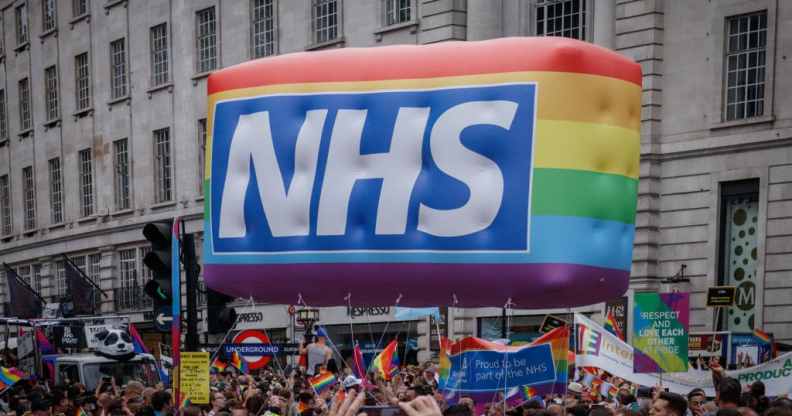NHS bosses urged to protect rainbow badges and ‘make healthcare safer for LGBTQ+ people’

An NHS banner seen during a Pride in London parade. (Getty)
NHS bosses have been urged to protect the rainbow badge for LGBTQ+ healthcare staff and patients alike.
In an opinion piece for The BMJ (formerly the British Medical Journal), medical student Nicholas Phillips argued that “efforts to promote a safe and positive healthcare environment for the LGBTQ+ community” must be redoubled in the wake of the COVID-19 pandemic.
Since 2018, rainbow NHS flag badges have been worn by LGBTQ+ staff and allies, to send a signal to queer patients that they are in a safe space.
But during the COVID-19 pandemic, its meaning became confused as the rainbow became a symbol of appreciation for NHS workers, appearing on posters across the country.
“As the use of this image as a token of thanks to NHS staff proliferated… the message it initially represented in the NHS — as a symbol of LGBTQ+ allyship — started to blur,” Phillips wrote.
The article called on leaders to preserve the original meaning of the rainbow badge and to take the opportunity to tackle wider healthcare inequalities.
“Of course, no person, organisation, or movement owns the symbol of a rainbow,” Phillips wrote.
Phillips added: “In the wake of the pandemic, governing bodies and hospital trusts must put greater effort into promoting the NHS rainbow badge and the initiative behind it, reclaiming what it symbolised and highlighting this message to the public.
“The badge’s use as a tool to educate staff on LGBTQ+ matters and to help LGBTQ+ patients feel safe should be accompanied by wider efforts to tackle healthcare inequalities and discrimination, promote inclusion, and celebrate diversity.
“Making healthcare a safer space for LGBTQ+ people is within our grasp and should be worked towards with renewed focus in the NHS.”
Over 90 per cent of NHS trusts have taken part in the Rainbow Badge Initiative, and staff must undertake training to join.
The rainbow badge originally started as an unofficial campaign in 2018, when Evelina London doctor Mike Farquhar noticed a disconnect with some of his straight colleagues.
He felt that a lot of staff, while supportive of LGBTQ+ issues, were not sure why inclusion efforts were needed and how they could best help.
“The whole point of this project was to bridge that gap. It can’t just be a small number of LGBT+ doctors and nurses and healthcare practitioners addressing this – we have to make sure that everybody’s aware of it.”
After a brief dispute over the use of the NHS logo on unofficial badges, the initiative became an official NHS project.
A 2018 Stonewall study fond that one in seven LGBT people (14 per cent) avoid seeking healthcare for fear of discrimination from staff, while there is evidence that LGBTQ+ people face worse mental health outcomes.

